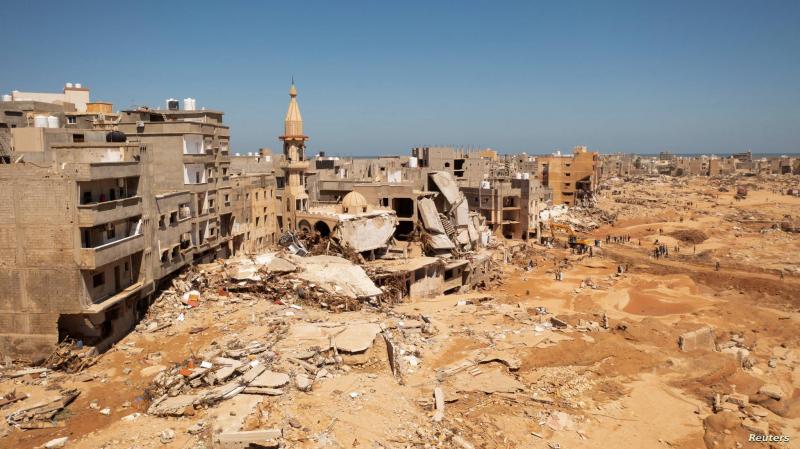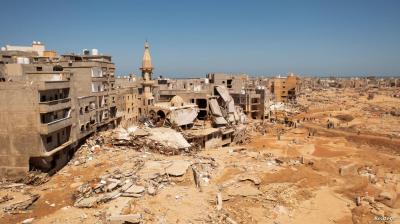Libyans in the city of Derna in the east of the country, whose homes were swept away by floods a week ago, found themselves today, Sunday, trapped between the hammer of staying in the city with a lack of fresh water and the anvil of fleeing through areas where floods have swept landmines. There are fears that thousands may have died after the collapse of two dams in Derna on September 10, leading to the collapse of residential buildings lining a normally dry riverbed while people were sleeping. Many bodies were washed out to sea, and the United Nations reports that more than a thousand people have been buried in mass graves.
As the sun rose on Sunday, the intensity of the scenes of destruction eased with the removal of piles of rubble placed by the side of empty roads, and quantities of tangled metals, some parts from vehicle wreckage, were lifted. Hamad Awad set up on an empty street with a bottle of water and bedcovers beside him. He said, "I am staying in our area trying to clean it and check on the missing... Thank God for giving us patience."
Entire areas were washed away in Derna, which is estimated to have a population of at least 120,000 people, or covered with mud. State media reported that at least 891 buildings were destroyed, while the mayor said that around 20,000 people may have died due to this disaster. Another resident mentioned that people are confused about what to do next. Wasfi, a resident who preferred to only give his first name, stated, "We still don’t know anything... We hear rumors... some try to reassure us and others say either leave the city or stay here. We have no water or resources."
A report from the United Nations Office for the Coordination of Humanitarian Affairs (OCHA) indicated that Libyan authorities had discovered that at least 55 children suffered from poisoning due to drinking contaminated water in Derna, where the displaced live in temporary shelters, schools, or are crowded into the homes of relatives or friends. The report stated that floodwaters carried landmines and other munitions left over from years of conflict, posing an additional risk to thousands of displaced people.
International relief organizations have sent emergency aid by air and some countries provided supplies and other assistance; however, the OCHA stated that more is needed. Meanwhile, the health minister in the eastern Libya government announced on Sunday that four members of a Greek rescue team died in a traffic accident while on their way to Derna from Benghazi, while seven others remain in critical condition. Three members of a Libyan family were also killed, two of whom were in serious condition.
The Libyan channel Al-Masar showed footage of the preparation of a French field hospital. Civil protection workers sent by Algeria gathered to sift through the rubble of what was once multi-story buildings with the help of dogs in an attempt to find any survivors. In the meantime, Hassan Awad, a resident of Derna, stated, "People came with aid from everywhere, which made it easier for us, and we felt we were not alone."
Awad pointed to a rusty pole extending between two buildings, stating that holding onto it is the reason his family survived the flood that destroyed their home and covered everything in mud. He added, "We found the bodies of neighbors, friends, and loved ones; I can’t describe what happened."
In Al-Bayda, a coastal residential area located west of Derna, the hospital is treating victims of the storm from Derna and the surrounding area. Doctors set up temporary barriers in the street to prevent floodwaters from reaching the building, but it still entered and its level rose inside. The hospital director, Abdul Rahim Mazq, said, "This affected the devices and infrastructure of the hospital's basement."
Volunteers distributed clothing and food in other areas of the city. Mohammed Shaheen, one of the supervisors of the initiative, said, "People left their homes with nothing; they didn’t even have time to take their underwear." Another volunteer, named Abdel Nabi, stated that the team came from the city of Al-Ajilat, about 1,200 kilometers away in western Libya, which has been intermittently in conflict with the east for more than a decade. He added, "People come to help those affected."
Libya, with a population of seven million, has been suffering from a lack of a strong central government since the NATO-backed uprising that ousted Muammar Gaddafi in 2011. Analysts stated that the disaster has led to some degree of coordination between the internationally supported government in Tripoli in the west and its rival administration in the east, but reconstruction efforts are likely to reignite disputes between the two sides.
Discrepancy
The OCHA report noted that at least 11,300 people have died, while more than ten thousand are still missing in Derna after Storm Daniel, which swept across the Mediterranean, hit the city and other coastal residential areas. The report attributed the casualty figures to the Libyan Red Crescent; however, a spokesperson for the Red Crescent stated that they had not published such a casualty count and referred Reuters to government spokespersons who said, "The numbers are changing, and the Red Crescent is not responsible for that."
Dr. Osama Al-Fakhri, director of the Health Minister's office in the eastern government, indicated, "The death toll so far is 3,252, all of whom have been buried." He added that 86 bodies have been recovered from under the rubble and that rescue operations are ongoing. Al-Fakhri said, "There is no specific number regarding the missing because entire families have died without anyone coming to report them, and there is duplication in registrations at different hospitals."
Other Libyan officials have previously spoken about more than five thousand deaths. The OCHA indicated that more than 40,000 people have been displaced, warning that this number is likely to be much higher due to the difficulty of accessing the hardest-hit areas such as Derna, where at least 30,000 people have been displaced. The head of the internationally recognized Government of National Unity in Tripoli, Abdul Hamid Dbeibeh, described the floods as an unprecedented disaster. The chairman of the Libyan Presidential Council, Mohammed Al-Menfi, called for the necessity of national unity.




